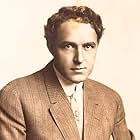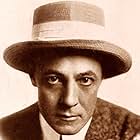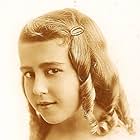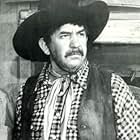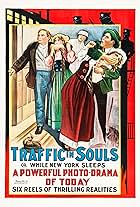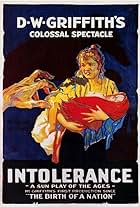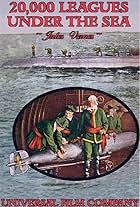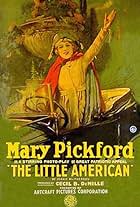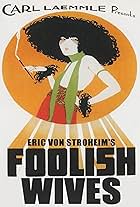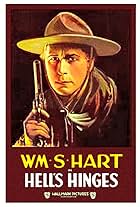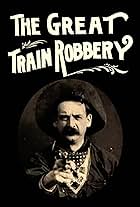IMDb RATING
5.7/10
1.1K
YOUR RATING
A chivalrous British officer takes the blame for his cousin's embezzlement and journeys to the American West to start a new life on a cattle ranch.A chivalrous British officer takes the blame for his cousin's embezzlement and journeys to the American West to start a new life on a cattle ranch.A chivalrous British officer takes the blame for his cousin's embezzlement and journeys to the American West to start a new life on a cattle ranch.
'Baby' Carmen De Rue
- Hal
- (as Baby de Rue)
- Directors
- Writers
- All cast & crew
- Production, box office & more at IMDbPro
Storyline
Did you know
- TriviaCommonly accepted as the first feature-length film to be made in Hollywood, CA. Short films such as In Old California (1910) had previously been made in the neighborhood.
- GoofsEarly in the film, when Captain James Wynnegate (played by Dustin Farnum) is on board the sailing ship, he writes a note asking that a "check" enclosed with the note be cashed for him. Since Captain Farnum is an Englishman, he would have spelled the word as "cheque", the standard British spelling. (Moreover, the handwriting in the note is scarcely that of an educated British military officer: the lines of writing are crooked and the letters are crudely formed.)
- Quotes
Lady Diana: Jim, I want you to go away for my sake!
- Alternate versionsA seemingly unrestored print aired 5 April 2004 on Turner Classic Movies with a new orchestral score by H. Scott Salinas.
- ConnectionsFeatured in The House That Shadows Built (1931)
Featured review
History seems to consider The Squaw Man to be Hollywood's first feature-length film. However, Custer's Last Fight (Francis Ford, 1912*) runs at just under an hour. I'd consider that feature-length. And it was made in Hollywood. So, I dunno.
In any event, this is a really important film, historically, and Cecil B. DeMille's first feature--and his first film, period. Supposedly, he hadn't even seen a film until shortly before he made this. It totally shows.
It's kind of a clumsy jumble of scenes taken from a book. There's no real cinematic logic or flow. There are lots of scenes of people just standing around talking--which doesn't really work in a silent film, especially without many intertitles. Characters were hard to tell apart, because they were mostly filmed in long shot. I found it all somewhat difficult to follow, although I guess I got the gist.
Still, some of the individual scenes are interesting. I suppose the theme of interracial marriage was probably notable for the time (and its outcome predictable). And the film ws mostly filmed on location, which made it a bit easier to watch. I don't imagine I'll ever feel a burning desire to see this again, but it was worthwhile seeing once as an historical document.
C. B. DeMille did learn his craft quickly. By 1915, he was doing vastly better work than this (Carmen, The Cheat).
5.5/10
* Although the version I saw was a 1920s reissue, and it's possible it had some footage added, but it seems unlikely, because that almost certainly would have been jarringly obvious.
In any event, this is a really important film, historically, and Cecil B. DeMille's first feature--and his first film, period. Supposedly, he hadn't even seen a film until shortly before he made this. It totally shows.
It's kind of a clumsy jumble of scenes taken from a book. There's no real cinematic logic or flow. There are lots of scenes of people just standing around talking--which doesn't really work in a silent film, especially without many intertitles. Characters were hard to tell apart, because they were mostly filmed in long shot. I found it all somewhat difficult to follow, although I guess I got the gist.
Still, some of the individual scenes are interesting. I suppose the theme of interracial marriage was probably notable for the time (and its outcome predictable). And the film ws mostly filmed on location, which made it a bit easier to watch. I don't imagine I'll ever feel a burning desire to see this again, but it was worthwhile seeing once as an historical document.
C. B. DeMille did learn his craft quickly. By 1915, he was doing vastly better work than this (Carmen, The Cheat).
5.5/10
* Although the version I saw was a 1920s reissue, and it's possible it had some footage added, but it seems unlikely, because that almost certainly would have been jarringly obvious.
- plaidpotato
- Apr 5, 2004
- Permalink
- How long is The Squaw Man?Powered by Alexa
Details
Box office
- Budget
- $20,000 (estimated)
- Runtime1 hour 14 minutes
- Sound mix
- Aspect ratio
- 1.33 : 1
Contribute to this page
Suggest an edit or add missing content









